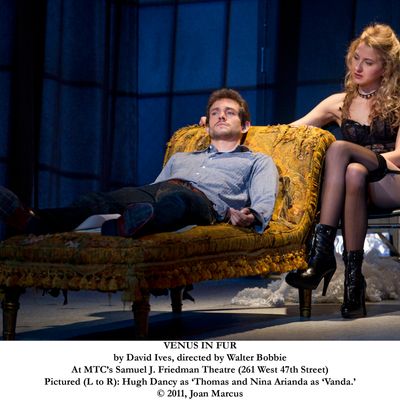
Theater, David Ives would like to remind you, is a lot like S&M: dominance, submission, the switch, the whole leather enchilada. You’ve got to take direction, surrender to the Moment, abandon autonomy to stories and storytellers, and occasionally, if you’re lucky, dress up as a slave. Whether you’re an actor, a director, or a writer, there’s always the threat or guarantee of ritual humiliation, beginning with that most perverse of all rites, the Audition, where the power imbalance is simply assumed.
Thomas (Hugh Dancy), the arrogant young playwright cruisin’ for a bruisin’ in Ives’ toothsome little light-light-bondage comedy Venus in Fur, is a professional assumer, as well as an amateur misogynist — the enlightened kind, fiercely overeducated and deeply angry at some implicit, nonspecific insult umbilically attached to him at birth. At the top of the show, poor Thomas, exasperated after a long day of adjudicating other human beings, complains (to his wife/cell phone) that he’s just endured “35 incompetent actresses” reading for his adaptation of Venus in Furs, the 1869 erotic novel by post-romantic kink pioneer Leopold von Sacher-Masoch. (Von Sacher-Masoch — Thomas pedantically informs us — lent his name to the proclivity he codified, masochism.) For the plum role of Vanda Dunayev, proto-dominatrix, your average twittering gum-popper who can’t “pronounce ‘degradation’ without a tutor” simply won’t do. “And whatever happened to femininity?” he moans. “Young women can’t even play feminine these days. Half are dressed like hookers, half like dykes.” He despairs that the world is empty of “sexy-slash articulate young women with some classical training and a particle of brain in their skull.” Thunder rolls. Lightning flashes. Can you smell a comeuppance on the wind?
In blows Vanda (Nina Arianda), hours late for her audition, and, apart from her mysteriously apt name, the sum total of Thomas’s nightmares: A bubblehead who salts her speech with “fucks” and “likes,” shows up with a bagful of thrift-store costumes and accessories, and drops little Jolly Ranchers of giddy ignorance at every opportunity. “‘Masochism,’ ‘Masoch,’ I shoulda seen that,” she marvels, bowing and scraping. “Wow. So S&M is like named after the guy! Cool!” Only when Thomas condescendingly corrects her (“I’m not sure that’s what Sacher-Masoch had in mind”) does she hint at the true ingenuity beneath her ingenuousness, her talent for testicular deflation: “Sure. He thought he wrote a serious novel, everybody else thought it was porn.” When Thomas protests that it’s not “porn” but a “central text of world literature,” Vanda presses, “You don’t think it’s porn? Or porn-ish … ? For medieval times, 18-whatever, I mean?” If it wasn’t porn in the first place, she implies, Thomas has pornified it with his adaptation. “Anyway, you don’t have to tell me about sadomasochism,” she says. “I’m in the theater.”
Vanda, of course, is more than she appears to be: When she finally begins to read for the part, with Thomas enlisted as her reluctant scene partner, the ditzy scrim falls away and here’s the queenly Dunayev, appearing suddenly a full three feet taller than the imbecile actress. The audition has begun, but the tables are turned, and turned, and jujitsu’d, and then turned again. Arianda, who once again lives up to her growing and richly deserved legend, negotiates these hairpin switches from moron to mistress — the play’s operative gag — with no visible transitions and not a bead of sweat. Her metamorphoses are both physical and metaphysical: Is this magic? Or masochism? Or just theater? And is there a difference?
Arianda brings that critical hint of the contemporary — maybe just the daintiest flavor of Gaga, the thrill of designing one’s own hologram—into a play that lays siege to a form of curmudgeonly male hauteur that is, itself, something of a museum piece. (Venus is the kind of thing Woody Allen might aspire to write if he didn’t hate women so much.) Dancy’s Thomas spends most of the play back on his heels, trying to figure out whom he’s really dealing with here. But we’re way ahead of him, and the script is at its most tedious when it tries to restore his dominance, his control of the room, just to force the story’s next beat. Ives is clearly a bit of a control freak himself, whose studious, wheels-within-wheels theater pranks (his verse-perfect meta-Molière adaptation School for Lies, as well as the intricate one-act comedies of All in the Timing, where an unseen force keeps hitting the instant-replay button) reveal a certain fetish for intense organization. He doesn’t really “do” chaos, and the purpose of the play is to complete its tidy self, to close the loop of its own comic logic, not to send our world into uproarious upheaval. Venus is really just a clever sketch, fattened to nearly two hours on perhaps one too many theater-as-bondage riffs.
But taste, style, and snappy dialogue can take you a long way, and a flawless cast will do the rest. Arianda and Dancy (with assistance from director/wrestling coach Walter Bobbie, no stranger to well-staged dom games) generate a chemistry that makes the play’s actual heft entirely beside the point. Dancy has a ball with Thomas’s prickly narcissism and fragile, grotesquely manipulable ego — when Vanda encourages him to adopt an accent, his dilettante’s delight at slipping into something “Continental” is palpable, and hilarious. But the show must and absolutely does belong to Arianda, whose Vanda produces the tactile illusion of personhood in a walking joke, a male author’s fantasy of explicit self-flagellation and implicit self-congratulation. She dominates everything — even, it seems, the playwright, both the fake one onstage and the real one off. It’s an honor to spend an evening at her mercy.

